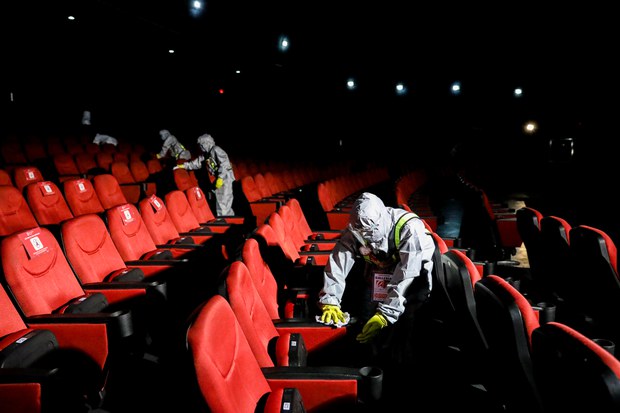Philippines to Require Vaccinations for On-Site Office Workers Next Month
2021.11.12
Manila
 Workers in protective suits sanitize a movie theater before the reopening of the shopping malls in Quezon City, Metro Manila, Oct. 15, 2021.
Workers in protective suits sanitize a movie theater before the reopening of the shopping malls in Quezon City, Metro Manila, Oct. 15, 2021.
The Philippine government as of next month will require mandatory COVID-19 vaccinations or frequent testing for all eligible employees working in offices, the presidential palace said Friday, leading one opposition politician to question the move’s legality.
The order, which takes effect on Dec. 1, covers employees from public and private agencies or companies who work at offices in parts of the country that have stockpiles of vaccine, presidential spokesman Harry Roque said in a statement.
“[COVID-19] vaccination of eligible employees tasked to do on-site work shall be required by all establishments and employers in the public and private sector,” he said.
“Eligible employees who remain unvaccinated may not be terminated, but they shall be required to undergo regular … tests at their own expense.”
The Philippines is among countries in Southeast Asia hit hardest by the coronavirus disease, with 2.8 million cases and 45,000 related deaths recorded to date, but the government has ramped up vaccination efforts lately.
The government has fully inoculated about 30 million people, according to the National COVID-19 Vaccination Dashboard. A three-day nationwide vaccination program to immunize another 15 million is set to begin on Nov. 29.
To encourage more people to be vaccinated, the central government is calling on cities and towns to provide “incentives for fully vaccinated individuals,” Roque said.
However, Carlos Isagani Zarate, a congressman from the opposition, said requiring people to get vaccinated had no “legal basis” and was a clear violation of human rights.
“The state is partly to blame for vaccine hesitancy because it needs to educate people about it,” Zarate told reporters.
“The problem is that the administration has enforced military solutions and has not performed to control the pandemic. Now, they plan to force and scare people into getting vaccinated instead of convincing them with a good explanation,” he said.
Dr. Anthony Leachon, a former adviser to the government task-force on COVID-19, suggested that the government might be moving too quickly on mandating vaccinations for on-site workers. The government should wait to achieve a 70 percent vaccination rate of its eligible population before contemplating such a move, he said.
“[B]ased on European countries’ experiences, mandating vaccination by penalizing patients or the people to pay for their tests might boomerang,” Leachon said.
Earlier this week, the head of the COVID-19 task force, Carlito Galvez, said the government planned to inoculate 70 percent of its target population of 54 million Filipinos with at least one dose by the end of November.
Manila has said it has sufficient supply of vaccines to achieve the minimum level of protection.
Galvez had also said lately that he favored making coronavirus vaccinations compulsory as a condition for low-income Filipinos to receive to cash subsidies from the government. President Rodrigo Duterte once warned that the government could compel those who do not wish to be vaccinated under the emergency powers.
“There is no law [to force anyone], but the law of necessity is there,” Duterte had said.







